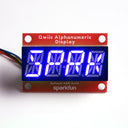SparkFun Qwiic Alphanumeric Display
by Sparkfun




We are quite familiar with seven-segment displays. We see them on our alarm clocks, ovens, and microwaves. By adding more segments to each digit you can display more than just numbers! Introducing the brand new SparkFun Qwiic Alphanumeric Display.
These fourteen-segment digits allow you display all sorts of numbers, characters, and symbols. With Qwiic, simply plug it in and go. No soldering, no figuring out which is SDA or SCL, and no voltage regulation or translation required!
The SparkFun Alphanumeric Display Arduino library makes printing strings to the display as easy as calling the print() function. With this library, you'll be able to send I2C commands to the VK16K33 LED driver chip to light up segments (including the decimal point or colon) and even scroll your string across the display. You can download the library through the Arduino library manager by searching 'SparkFun Alphanumeric Display' or you can get the GitHub repo as a .zip file and install the library from there.
The VK16K33 also supports I2C address configuration. Simply close a combination of the address jumpers on the back and you can communicate with up to four displays on the same bus. The slim board design also features detachable stand off holes, vertical Qwiic connectors, and internal mounting holes.
The SparkFun Qwiic Connect System is an ecosystem of I2C sensors, actuators, shields and cables that make prototyping faster and less prone to error. All Qwiic-enabled boards use a common 1mm pitch, 4-pin JST connector. This reduces the amount of required PCB space, and polarized connections mean you can’t hook it up wrong.
Get started with the Qwiic Alphanumeric Display Hookup Guide
Want to plug this display into a Raspberry Pi Pico or other RP2040 board armed with a QwST connector? Check out Tony's MicroPython and CircuitPython drivers!
Features
- Operating Voltage: 3.3V
- Integrated RC oscillator
- Maximum display segment numbers: 128 patterns
- 13×3 matrix key scan circuit
- 16-step dimming circuit
- I2C Addresses: 0x70 (0x71, 0x72, 0x73)
- 2x Qwiic connectors
- 2x Wall Mounting Points
Documents
We no longer stock this product
It's sad to say goodbye but sometimes we have to retire products to make way for new things.
You may still be able to buy this product directly from our friends at Sparkfun - check out their website!
Shop with confidence – we've been serving the hobbyist electronics, Maker, and retro gaming communities since 2012.
- Satisfaction or refund guarantee
- Worldwide shipping via mail or courier
- 57,000+ customer reviews
- Secure website and payments

